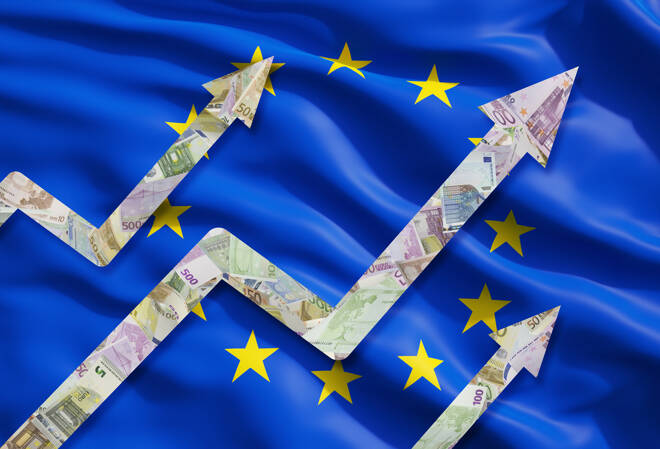Advertisement
Advertisement
European Equities: German GDP Numbers, FED Policy, and COVID-19 in Focus
By:
Following comforting PMI numbers for August, German GDP figures for the second quarter will be in focus later this morning. FED monetary policy and COVID-19 remain key drivers, however.
Wednesday, 25th August
German Ifo Business Climate Index (Aug)
Thursday, 26th August
GfK German Consumer Climate (Sep)
The Majors
It was a bullish day for the European majors on Monday.
The DAX30 rose by 0.28%, with the CAC40 and the EuroStoxx600 seeing gains of 0.86% and 0.66% respectively.
Following the previous week’s losses, the majors were in recovery mode. Private sector PMI figures from the Eurozone could have been worse, delivering some comfort.
Ultimately, however, plenty of uncertainty over FED monetary policy and the Delta variant remained negatives for the majors.
The Stats
It was a busier economic calendar through the European session, with private sector PMIs in focus.
According to prelim figures for August, Germany’s manufacturing PMI fell from 65.9 to 62.7. Economists had forecast a decline to 65.0. The services PMI slipped from 61.8 to 61.5 versus a forecasted 61.0.
For France, the manufacturing PMI fell from 58.0 to 57.3, which was in line with forecasts. The Services PMI fell from 56.8 to 56.4. Economists had forecast an increase to 57.0.
The Eurozone’s Manufacturing PMI fell from 62.8 to 61.5, with the Services PMI falling from 59.8 to 59.7. Economists had forecast PMIs of 62.0 and 59.8 respectively. As a result, the Composite PMI fell from 60.2 to 59.5 versus a forecasted 59.7.
According to the Eurozone’s prelim survey,
- Eurozone business activity continued to grow at a fast pace in August.
- The rate of expansion cooled only slightly despite supply chain delays.
- Growth sector growth exceeded that of the manufacturing sector for the first time since the pandemic.
- Firms’ costs and prices charged rose at some of the fastest rates seen over the past 20-years.
- Business confidence was subdued as a result of the Delta variant.
- In spite of softer confidence, hiring remained the strongest for 21-years.
- Inflows of new orders were amongst the highest seen in the past two decades.
- Within the Eurozone, Germany continued to lead the expansion. This was in spite of growth softening from July’s 23-year record high.
Late in the European session, consumer confidence figures for the Eurozone also influenced.
In August, the Eurozone’s Consumer Confidence Indicator fell from -4.4 to -5.3. Economists had forecast a decline to -5.0.
From the U.S
Prelim private sector PMIs were also in focus along with housing sector data.
The Manufacturing PMI fell from 63.4 to 61.2, with the Services PMI falling from 59.9 to 55.2. Economists had forecast PMIs of 62.5 and 58.3 respectively.
Housing sector data from the U.S had a muted impact on the European majors.
The Market Movers
For the DAX: It was a mixed day for the auto sector on Monday. Volkswagen rose by 1.19% to lead the way, with Daimler (+0.44%) also finding support. BMW and Continental saw modest losses of 0.01% and by 0.04% respectively, however.
It was a bullish day for the banks. Deutsche Bank and Commerzbank ended the day with gains of 0.72% and 0.56% respectively.
From the CAC, it was a relatively bullish day for the banks. BNP Paribas and Soc Gen rose by 1.17% and by 1.16% respectively, with Credit Agricole rallying by 1.75%.
It was a mixed day in the red for the French auto sector, however. Stellantis NV rose by 0.81%, while Renault fell by 0.40%.
Air France-KLM rallied by 2.51%, with Airbus SE rising by 1.12%.
On the VIX Index
It was a 2nd consecutive day in the red for the VIX on Monday.
Following a 14.35% slide on Friday, the VIX fell by a further 7.60% to end the day at 17.15.
The NASDAQ rallied by 1.55%, with the Dow and the S&P500 seeing gains of 0.61% and by 0.85% respectively.
The Day Ahead
It’s a relatively busy day ahead on the Eurozone’s economic calendar. 2nd quarter GDP numbers for Germany are due out later this morning.
With little else for the markets to consider, expect plenty of influence from the numbers.
From the U.S, new home sales figures, due out late in the day, should have a muted impact on the majors.
FOMC member chatter ahead of Jackson Hole and COVID-19 will also remain the key areas of interest.
The Futures
In the futures markets, at the time of writing, the Dow Mini was up by 69 points.
For a look at all of today’s economic events, check out our economic calendar.
About the Author
Bob Masonauthor
With over 28 years of experience in the financial industry, Bob has worked with various global rating agencies and multinational banks. Currently he is covering currencies, commodities, alternative asset classes and global equities, focusing mostly on European and Asian markets.
Advertisement
